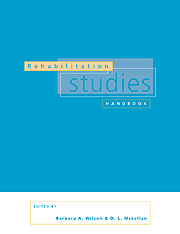Book contents
- Frontmatter
- Contents
- List of contributors
- 1 Introduction to rehabilitation
- 2 Disabled people in society
- 3 Disability equality training
- 4 Towards a therapeutic alliance model of rehabilitation
- 5 Rehabilitation education: a learner-centred approach
- 6 Work, occupation and disability
- 7 Management in rehabilitation
- 8 Research and evaluation in rehabilitation
- 9 Statistical methods
- 10 Social policy, disability and rehabilitation
- 11 Principles of the acquisition of sensorimotor skills
- 12 Management of acquired cognitive disorders
- 13 Challenging behaviour: helping people with severe brain damage
- 14 Pain
- 15 The multiply handicapped child
- 16 The transition to adult life
- 17 Factors specific to disabled elderly people
- Index
16 - The transition to adult life
Published online by Cambridge University Press: 06 November 2009
- Frontmatter
- Contents
- List of contributors
- 1 Introduction to rehabilitation
- 2 Disabled people in society
- 3 Disability equality training
- 4 Towards a therapeutic alliance model of rehabilitation
- 5 Rehabilitation education: a learner-centred approach
- 6 Work, occupation and disability
- 7 Management in rehabilitation
- 8 Research and evaluation in rehabilitation
- 9 Statistical methods
- 10 Social policy, disability and rehabilitation
- 11 Principles of the acquisition of sensorimotor skills
- 12 Management of acquired cognitive disorders
- 13 Challenging behaviour: helping people with severe brain damage
- 14 Pain
- 15 The multiply handicapped child
- 16 The transition to adult life
- 17 Factors specific to disabled elderly people
- Index
Summary
Introduction
The teenage years are a time of adjustment for all young people but for those with disabilities it is also a time of heightened awareness of individual problems and a growing realisation of possible implications for the future. While their non-disabled peers are taking major steps in independence they often experience a sense of being left behind.
Besides having to make considerable emotional adjustments, young people with disabilities have more to learn than their peers to cope with life in general. Much education may have been lost for medical reasons and their disabilities may slow them down, yet the expectation is that maturation and education attainment will be achieved in the same time as their non-disabled contemporaries.
Education in the UK, as in the majority of countries, is organised by age and McGinty & Fish (1992: 38) point out that for pupils with special needs the end of the school stage should not be strictly timed to this but more to the individual's readiness to move on to the next stage. It follows, too, that more time is needed to complete further and higher education. The Further and Higher Education Act (1992) recognises this by permitting education up to 25 years; however, it remains to be seen how freely this will be funded and implemented.
The transition to adulthood can be defined as a period of time between the teens and early twenties when a young person acquires the skills necessary to function as an adult.
- Type
- Chapter
- Information
- Rehabilitation Studies Handbook , pp. 355 - 378Publisher: Cambridge University PressPrint publication year: 1997



